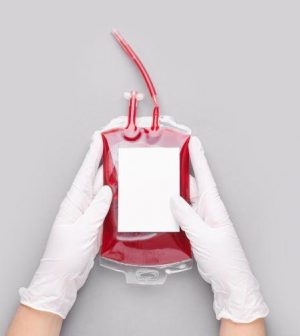- Could Your Grocery Store Meat Be Causing Recurring UTIs?
- Are You Making This Expensive Thermostat Error This Winter?
- Recognizing the Signs of Hypothyroidism
- 10 Strategies to Overcome Insomnia
- Could Artificial Sweeteners Be Aging the Brain Faster?
- Techniques for Soothing Your Nervous System
- Does the Water in Your House Smell Funny? Here’s Why
- Can a Daily Dose of Apple Cider Vinegar Actually Aid Weight Loss?
- 6 Health Beverages That Can Actually Spike Your Blood Sugar
- Treatment Options for Social Anxiety Disorder
‘Whole Blood’ Transfusions Might Save More Lives

Patients who are bleeding out have a better chance of surviving if they’re given whole blood transfusions, a new study shows.
Traditionally, patients with significant bleeding are given transfusions of specific blood components — red blood cells, plasma and platelets that have been separated out from whole blood.
But researchers found that early whole blood transfusions were associated with a 60% improved chance of survival within 24 hours and 68% better odds of survival at 30 days.
However, that’s only if whole blood is given promptly.
A delay as short as 14 minutes after arriving at the hospital significantly reduced this survival benefit, researchers found.
The study was published Jan. 31 in the journal JAMA Surgery.
“These findings may lead to clinicians and hospital systems to consider whole blood as a standard emergency transfusion product incorporated into the massive transfusion protocol,” said researcher Dr. Crisanto Torres, an assistant professor of surgery at Boston University School of Medicine.
“There may be a similar benefit for using whole blood transfusion at the scene of injury or during transport,” Torres added in a university news release.
Massive bleeding caused by a traumatic injury is the leading cause of preventable deaths in the United States, researchers said in background notes. Most of these deaths occur within six hours.
For the study, researchers analyzed the cases of nearly 1,400 patients across the United States who arrived at a hospital ER in dire need of a massive blood transfusion due to bleeding from a traumatic injury.
They found that patients who received whole blood transfusions shortly after their arrival in the ER had improved survival rates.
“Our study indicates a targeted time goal for whole blood administration within 14 minutes of hospital arrival. There is a decrease in survival probability for each minute delay in whole blood transfusion, but the most pronounced reduction in the probability of survival was seen after 14 minutes,” said Torres, who is also a trauma surgeon at Boston Medical Center.
More information
The National Institutes of Health has more about blood transfusion.
SOURCE: Boston University, news release, Jan. 31, 2024
Source: HealthDay
Copyright © 2026 HealthDay. All rights reserved.










